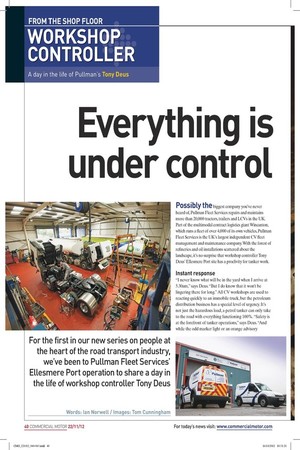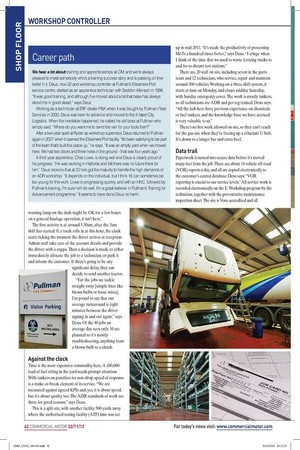Everything is under control
Page 31

Page 33

Page 34

If you've noticed an error in this article please click here to report it so we can fix it.
Possibly the biggest company you’ve never heard of, Pullman Fleet Services repairs and maintains more than 20,000 tractors, trailers and LCVs in the UK. Part of the multimodal contract logistics giant Wincanton, which runs a fleet of over 4,000 of its own vehicles, Pullman Fleet Services is the UK’s largest independent CV fleet management and maintenance company. With the forest of refineries and oil installations scattered about the landscape, it’s no surprise that workshop controller Tony Deus’ Ellesmere Port site has a proclivity for tanker work.
Instant response
“I never know what will be in the yard when I arrive at 5.30am,” says Deus. “But I do know that it won’t be lingering there for long.” All CV workshops are used to reacting quickly to an immobile truck, but the petroleum distribution business has a special level of urgency. It’s not just the hazardous load, a petrol tanker can only take to the road with everything functioning 100%. “Safety is at the forefront of tanker operations,” says Deus. “And while the odd marker light or an orange advisory warning lamp on the dash might be OK for a few hours on a general haulage operation, it isn’t here.” The first activity is at around 5.30am, after the 5am shift has started. If a truck rolls in at this hour, the clock starts ticking the moment the driver arrives at reception. Admin staff take care of the account details and provide the driver with a cuppa. Then a decision is made to either immediately allocate the job to a technician, or park it and inform the customer. If there’s going to be any significant delay, they can decide to send another tractor.
“For the jobs we tackle straight away [simple fixes like blown bulbs or loose wires], I’m proud to say that our average turnaround is eight minutes between the driver signing in and out again,” says Deus. Of the 40 jobs an average day sees, only 10 are planned so it’s mostly troubleshooting, anything from a blown bulb to a clutch.
Against the clock
Time is the most expensive commodity here. A £60,000 load of fuel sitting in the yard needs prompt attention. With tankers on penalties for non-drop, speed of response is a make-or-break element of its service. “We are measured against agreed KPIs and, yes, it is about speed, but it’s about quality too. The ADR standards of work are there for good reasons,” says Deus.
This is a split site, with another facility 500 yards away where the authorised testing facility (ATF) lane was set up in mid-2011. “It’s made the productivity of processing MoTs a hundred times better,” says Deus. “I cringe when I think of the time that we used to waste ferrying trucks to and fro to distant test stations.” There are 20 staff on site, including seven in the parts team and 12 technicians, who service, repair and maintain around 300 vehicles. Working on a three-shift system, it starts at 6am on Monday, and closes midday Saturday, with Sunday emergency cover. The work is mostly tankers, so all technicians are ADR and pet reg trained. Deus says: “All the lads here have previous experience on chemicals or fuel tankers, and the knowledge base we have accrued is very valuable to us.” There’s no hot work allowed on site, so they can’t reach for the gas-axe when they’re freeing up a reluctant U-bolt. It’s down to a longer bar and extra beef.
Data trail
Paperwork is turned into secure data before it’s moved many feet from the job. There are about 14 vehicle off-road (VOR) reports a day, and all are copied electronically to the customer’s central database. Deus says: “VOR reporting is crucial to our service levels.” All service work is recorded electronically on the E-Workshop program by the technician, together with the preventative maintenance inspection sheet. The site is Vosa-accredited and all documentation is encrypted on the database. “IT literacy is vital for technicians here,” says Deus.
Variety
As well as being a franchised MAN service and parts site, Deus’s technicians need to be familiar with the multibrand fleets that roll in over the pits. When CM called in there were four different marques of tractor in the service bays. To cope with the variety Pullman carries around £1m of parts stock and, with 32 workshops and service sites around the UK, it buys parts direct from manufacturers to get the best value.
Its hazardous goods specialisation brings in other useful work. An MAN tractor was being adapted for petroleum regulations compliance in the workshops. Deus says: “They come over as ADR tractors and we need to do about 60 hours’ work on each one to bring it up to full petroleum regulations standard.” Plastic mud wings need to be binned for alloy plate alternatives, standard glazing in the rear cab wall needs to be upgraded and double pole isolation installed. There were 21 others in the yard, all waiting to be prepped for Avanti Gas to work on LPG distribution. Pullman will be retaining the maintenance business on them. “Technicians don’t get bored here,” says Deus. “There are MoTs and brake re-lines, but the variety keeps the day on the move – at least that’s what I found when I was on the spanners.” Ellesmere Port also plays its role in Pullman 24/7 Assist, the company’s breakdown network, covering an 80-mile radius that encompasses Llandudno, the Wirral and Liverpool. Its average time from call to rolling is 55 minutes. And the best part of the job? “Every day is different,” says Deus. ■
Career path
We hear a lot about training and apprenticeships at CM, and we’re always pleased to meet somebody who’s a training success story and is passing on their belief in it. Deus, now 32 and workshop controller at Pullman’s Ellesmere Port service centre, started as an apprentice technician with Seddon Atkinson in 1996. “It was good training, and although I’ve moved about a bit that base has always stood me in good stead,” says Deus.
Working as a technician at ERF dealer P&K when it was bought by Pullman Fleet Services in 2000, Deus was keen to advance and moved to the ill-fated City Logistics. When the inevitable happened, he called his old boss at Pullman who simply said: “Where do you want me to send the van for your tools then?” After a two-year spell at Ryder as workshop supervisor, Deus returned to Pullman again in 2007 when it opened the Ellesmere Port facility. “It’s been satisfying to be part of the team that’s built this place up,” he says. “It was an empty yard when we moved here. We had two doors and three holes in the ground – that was four years ago.” A third year apprentice, Chas Lowe, is doing well and Deus is clearly proud of his progress. “He was working in Halfords and felt there was no future there for him.” Deus reckons that at 23 he’s got the maturity to handle the high demands of an ADR workshop. “It depends on the individual, but I think 16 can sometimes be too young for this work. Lowe is progressing quickly, and with an HNC, followed by Pullman’s training, I’m sure he’ll do well. I’m a great believer in Pullman’s Training for Advancement programme.” It seems to have done Deus no harm.
Out of Africa
When we visited Deus in Ellesmere Port, he’d not long come back from a twoweek stint in Lusaka, Zambia, where he was supporting international transport charity Transaid. He’d been there with technician colleague Mike Reilly to deliver technical training on MAN trucks. The standard of truck maintenance, driver training and the road infrastructure in Zambia all contribute to making the country’s roads a killing zone. Deus says: “It’s important to recalibrate yourself before you visit a transport operation in East Africa. Standards of maintenance need to be seen to be believed, but Transaid is making progress in a tough environment.” Pullman released the pair to deliver advanced diagnostics training on MAN trucks to eight motor vehicle lecturers at Zambia’s ITC (Industrial Training Centre) in Lusaka. On a ‘train the trainer’ basis, these lecturers will hopefully spread the word down the chain.
But changing the mindset is as big a challenge as getting training in place and access to proper parts. Visiting a coach operator still pondering its eighth fatal accident in as many months, Deus heard of footage from one of its driver’s mobile phones that showed a speedo needle at 160kph on poor roads. In a country where so many believe an accident is an act of God, getting people to take responsibility for their own actions is often the starting point. Transport is fuelling the booming construction and mining sector, so Pullman’s specialist knowledge in ADR and petrochemical movement could be a life-saver. Deus didn’t have a sun tan, but he says it was the most rewarding trip abroad he’d ever made.










































